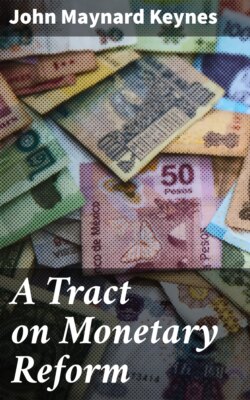Читать книгу A Tract on Monetary Reform - John Maynard Keynes - Страница 8
На сайте Литреса книга снята с продажи.
3. The Earner.
ОглавлениеIt has been a commonplace of economic text-books that wages tend to lag behind prices, with the result that the real earnings of the wage-earner are diminished during a period of rising prices. This has often been true in the past, and may be true even now of certain classes of labour which are ill-placed or ill-organised for improving their position. But in Great Britain, at any rate, and in the United States also, some important sections of labour were able to take advantage of the situation not only to obtain money wages equivalent in purchasing power to what they had before, but to secure a real improvement, to combine this with a diminution in their hours of work (and, so far, of the work done), and to accomplish this (in the case of Great Britain) at a time when the total wealth of the community as a whole had suffered a decrease. This reversal of the usual course has not been due to an accident and is traceable to definite causes.
The organisation of certain classes of labour—railwaymen, miners, dockers, and others—for the purpose of securing wage increases is better than it was. Life in the army, perhaps for the first time in the history of wars, raised in many respects the conventional standard of requirements,—the soldier was better clothed, better shod, and often better fed than the labourer, and his wife, adding in war time a separation allowance to new opportunities to earn, had also enlarged her ideas.
But these influences, while they would have supplied the motive, might have lacked the means to the result if it had not been for another factor—the windfalls of the profiteer. The fact that the business man had been gaining, and gaining notoriously, considerable windfall profits in excess of the normal profits of trade, laid him open to pressure, not only from his employees but from public opinion generally; and enabled him to meet this pressure without financial difficulty. In fact, it was worth his while to pay ransom, and to share with his workmen the good fortune of the day.
Thus the working classes improved their relative position in the years following the war, as against all other classes except that of the “profiteers.” In some important cases they improved their absolute position—that is to say, account being taken of shorter hours, increased money wages, and higher prices, some sections of the working classes secured for themselves a higher real remuneration for each unit of effort or work done. But we cannot estimate the stability of this state of affairs, as contrasted with its desirability, unless we know the source from which the increased reward of the working classes was drawn. Was it due to a permanent modification of the economic factors which determine the distribution of the national product between different classes? Or was it due to some temporary and exhaustible influence connected with inflation and with the resulting disturbance in the standard of value?
A violent disturbance of the standard of value obscures the true situation, and for a time one class can benefit at the expense of another surreptitiously and without producing immediately the inevitable reaction. In such conditions a country can without knowing it expend in current consumption those savings which it thinks it is investing for the future; and it can even trench on existing capital or fail to make good its current depreciation. When the value of money is greatly fluctuating, the distinction between capital and income becomes confused. It is one of the evils of a depreciating currency that it enables a community to live on its capital unawares. The increasing money value of the community’s capital goods obscures temporarily a diminution in the real quantity of the stock.
The period of depression has exacted its penalty from the working classes more in the form of unemployment than by a lowering of real wages, and State assistance to the unemployed has greatly moderated even this penalty. Money wages have followed prices downwards. But the depression of 1921–22 did not reverse or even greatly diminish the relative advantage gained by the working classes over the middle class during the previous years. In 1923 British wage rates stood at an appreciably higher level above the pre-war rates than did the cost of living, if allowance is made for the shorter hours worked.
In Germany and Austria also, but in a far greater degree than in England or in France, the change in the value of money has thrown the burden of hard circumstances on the middle class, and hitherto the labouring class have by no means supported their full proportionate share. If it be true that university professors in Germany have some responsibility for the atmosphere which bred war, their class has paid the penalty. The effects of the impoverishment, throughout Europe, of the middle class, out of which most good things have sprung, must slowly accumulate in a decay of Science and Art.
